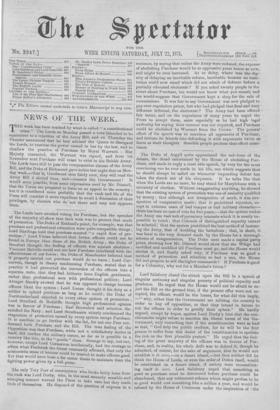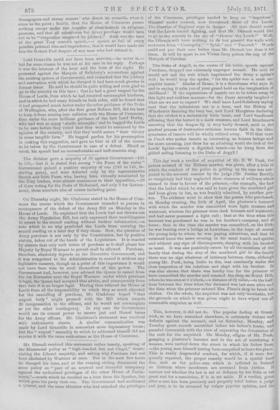Lord Salisbury closed the attack upon the Bill in a
speech of singular acrimony and singular poverty of political capacity and prudence. He urged that the House would not be afraid to re- ject the Bill on the ground that, if the present offer were not ac- cepted, the officers would be the losers, for what did this imply, —" why, either that the Government are robbing the country in order to buy off opposition, or that they intend in future to. rob the officers in order to gratify their spleen." He hardly argued, except by hopes, against Lord Derby's hint that the con- stituencies might refuse to sanction the liberal terms of the Go- vernment, only remarking that if the constituencies were as bad, as that, "God help the public creditor, for he will be the first person to suffer from this desire of the constituencies to spoliate the rich on the first plausible pretext." He urged that the feel- ing of the great majority of the officers was in favour of Pur- chase, and, in reality, his whole drift was to defend it, though he admitted, of course, for the sake of argument, that he would not establish it de 7100 9,—on a desert island,—but then neither did he think the House of Lords, or even the order of Dukes itself, would be established on a desert island, if society were reconstitut- ing itself de 710110. Lord Salisbury urged that something as good as purchase must be discovered before purchase could be abandoned, that any retirement scheme which might profess to be as good would cost something like a million a year, and would be refused by the House of Commons under the inspiration of the
demagogues and stump orators' who direct its councils, when it came to the point ; finally, that the House of Commons passes nothing except under the impulse of class-hatreds or religious passions, and that all substitutes for Army purchase would turn out to be " stagnation tempered by jobbery." Such was the tone of the great Tory orator's speecle—a speech so full of every possible political vice and imprudence, that it would have made the late Sir Robert Peel despair of any man who had uttered it.































